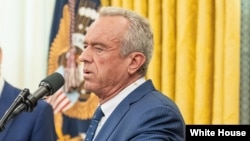“Like many legacy institutions, the [World Health Organization] has become mired in bureaucratic bloat, entrenched paradigms, conflicts of interest, and international power politics,” said U.S. Health and Human Services Secretary Robert Kennedy, Jr. in recent remarks to the Seventy-Eighth World Health Assembly in Geneva, Switzerland.
Secretary Kennedy made it clear that the Trump Administration fully intends to withdraw the U.S. from the World Health Organization, or WHO, and shared his vision for the future of global health.
“While the United States has provided the lion’s share of the organization’s funding historically,” said Secretary Kennedy, “other countries such as China have exerted undue influence over its operations in ways that serve their own interests and not particularly the interests of the global public.”
On January 20, President Donald Trump signed an executive order withdrawing the United States from the WHO and instructed the federal government to “pause the future transfer of any United States Government funds, support, or resources to the WHO.”
“Not only has the WHO capitulated to political pressure from China, it’s also failed to maintain an organization characterized by transparency and fair governance by and for its member states,” Secretary Kennedy said.
“The WHO often acts like it has forgotten that its members must remain accountable to their own citizens and not to transnational or corporate interests,” he noted.
In his proclamation of January 20th, President Trump stated, that the United States “noticed its withdrawal from the WHO in 2020 due to the organization’s mishandling of the COVID-19 pandemic that arose out of Wuhan, China, and other global health crises, its failure to adopt urgently needed reforms, and its inability to demonstrate independence from the inappropriate political influence of WHO member states. In addition, the WHO continues to demand unfairly onerous payments from the United States, far out of proportion with other countries’ assessed payments. China, with a population of 1.4 billion, has 300 percent of the population of the United States, yet contributes nearly 90 percent less to the WHO.”
Secretary Kennedy closed his remarks by inviting “health ministers around the world into a new era of cooperation,” calling for his international colleagues to “create new institutions or revisit existing institutions that are lean, efficient, transparent, and accountable.”
"The [World Health Organization] has become mired in bureaucratic bloat, entrenched paradigms, conflicts of interest, and international power politics,” said U.S. Health and Human Services Secretary Robert Kennedy, Jr.




